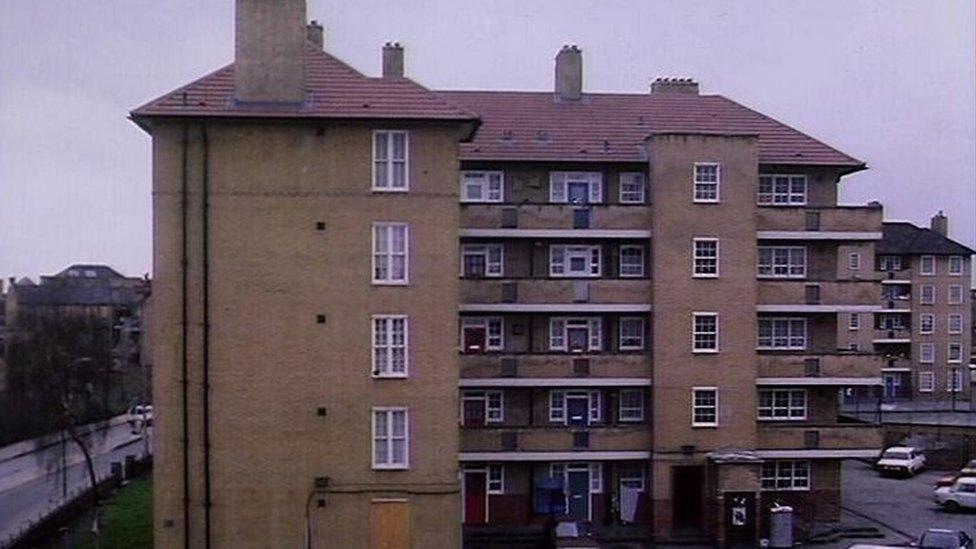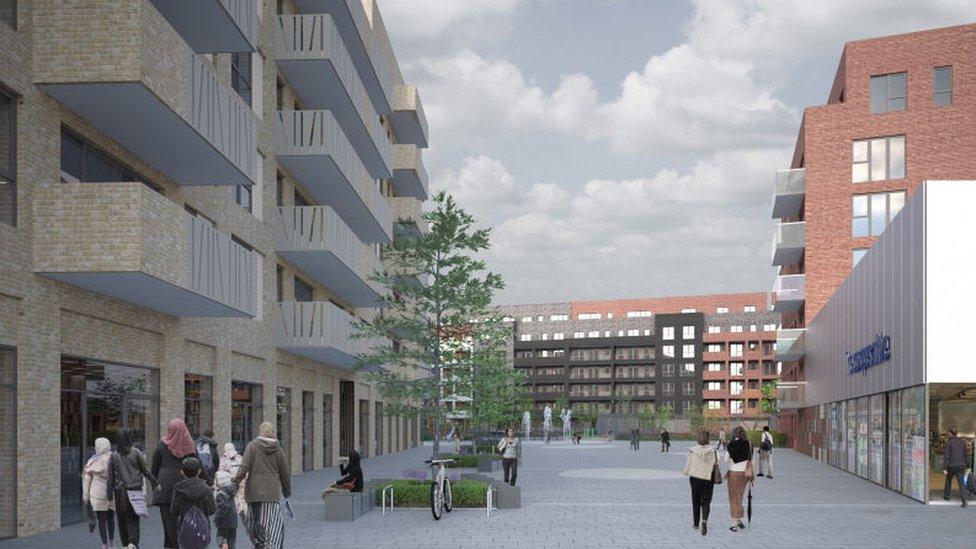Housing estate 'turnaround' pledged by David Cameron
- Published
- comments
"We should have a big shift towards more affordable housing to buy" - David Cameron
It is time to demolish some of England's worst council estates and "rebuild houses people feel they can have a future in", the PM has said.
David Cameron told the BBC demolishing estates "where people can feel trapped in poverty" could result in "better houses and more houses" being built.
A total of £140m will be made available to community groups, councils and housing associations for the scheme.
Labour say a bigger scheme with more investment is required.
More details of the plans will be set out in a speech by Mr Cameron on Monday.
He is also due to announce the doubling of government funding for relationship counselling for troubled families and relaunch a coalition proposal to issue vouchers for parenting classes.

Mr Cameron said 100 housing estates, like these in London, would be improved with the plan
Mr Cameron told the BBC's Andrew Marr Show: "I think sink housing estates, many built after the war, where people can feel trapped in poverty, unable to get on a build a good life for themselves, I think it is time with government money - but with massive private sector and perhaps pension sector help - to demolish the worst of these and actually rebuild houses that people feel they can have a real future in."
He said the "odd thing" about some of the high rise blocks was "they don't provide a huge number of houses".
There should be both affordable housing for rent and to buy, Mr Cameron said, but "a shift towards more affordable housing to buy" was needed.
Writing in the Sunday Times, external, Mr Cameron said "brutal high-rise towers" and "dark alleyways" in the worst estates "were a gift to criminals and drug dealers".
He said 100 housing estates would be improved with the plan.
Mr Cameron cited analysis which suggests almost three-quarters of people involved in the riots in England in 2011 came from such estates.
But Silla Carron, who has led resident campaigns in London, Plymouth and Bristol, to try to improve housing estates, said it was important that Mr Cameron spoke to residents about what they wanted because they were often not listened to.
She told BBC Radio 5 Live: "It's down to them to tell him what's wrong. They're the client here, they're the people who live on it, ask them what is wrong, take the advice from them. No he's not going to be able to do all of it, no-one can.
"But once you get something working you can carry on working towards a goal of making sure that people are listened to it's and it's not down to council officers or MPs to dictate 'well we'll do this, this and this'."
'Starting again'
The initiative will be headed by Lord Heseltine, who oversaw Liverpool and London's regeneration in the 1980s.
Although no estates have yet been identified, the funding will be made available to help community groups, councils and housing associations with planning and early construction costs.
A panel to be chaired by Lord Heseltine will report on how investment from bodies like pension funds might be unlocked and draw up a list of sites that could benefit from regeneration.
It will also consider how to get past blockages in the planning process.
Shadow housing minister John Healey said: "Any extra to help councils build new homes is welcome but Conservative ministers have halved housing investment since 2010 and are doing too little to deal with the country's housing pressures.
"People simply won't see this small-scale scheme stretched over 100 estates making much difference to the housing problems in their area."
Brian Robson, policy and research manager for housing at the Joseph Rowntree Foundation charity, said it was true that poor housing and run down estates could trap people in poverty.
But he said he worried the government was relying too much on private investment, which risked "pushing people out of the places where they have roots".
Campbell Robb, chief executive of the charity Shelter, said: "It is essential for the government to consult with the people who live in and around these developments as they develop their plans, and, even more importantly, replace every home which is re-developed like for like."
- Published10 January 2016

- Published4 January 2016

- Published22 December 2015

- Published20 September 2015
